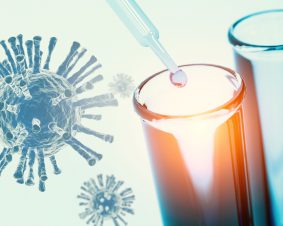 >
Spotlight July 2021: The Path to Digital Material Research – It is never too late to start
>
Spotlight July 2021: The Path to Digital Material Research – It is never too late to start
Machine Learning, Artificial Intelligence, Big Data…. Have you read these words lately? No, these are not just buzzwords. The digitalisation of science is an evolving topic that is gaining importance with each passing day. That is why this month we would like to introduce you to the article “Digital Transformation in Materials Science: A Paradigm Change in Material’s Development” by J. Kimmig, from the Schubert group in Jena, et. al.
This paper explores the current developments in automation and digitalisation in materials science and assesses the challenges in materials preparation and characterisation, as well as data management, data analysis, experiment design and manufacturing. The publication begins with a clarification of common terms from the field of digitalisation and explains the importance of applying FAIR principles in dealing with data from the very beginning. Using examples of digital solutions, effective strategies for achieving digital materials science are presented. The ways in which these strategies enable efficiency and innovation are outlined consistently throughout the paper and provide a clear picture of the benefits in each case.
Although the safety of materials and the associated research is not part of the review, it is fully plausible that the mentioned procedures and consequences are also crucial for safety research, for example: The mentioned concept of storing “negative” data can be directly transferred to safety research.
Original Publication:
Kimmig, J. et al. (2021). Digital Transformation in Materials Science: A Paradigm Change in Material’s Development. Advanced Materials, 33(8), 2004940. DOI: 10.1002/adma.202004940

Weitere Spotlights
Spotlight May 2023: Dual energy – edible batteries
An Italian research group reports on edible batteries that supply electric current and can be digested as food, thus providing energy a second time. What sounds funny at first has a serious background, because in medicine, power sources are needed that could be transported through the digestive tract and possibly remain in the body unintentionally, […]
Read moreSpotlight December 2020: Rethinking Nanosafety – Part II
In December we would like to draw attention to the special issue: Rethinking Nanosafety – Part II in small. In the July Spotlight we already presented Part I. This special issue “Rethinking Nanosafety – Part II” also features research papers by renowned scientists in the field of nanosafety research. The first part of this special […]
Read moreSpotlight March 2021: Is Nanotechnology the Swiss Army Knife against Future Pandemics?
The COVID 19 outbreak has led to a fundamental rethinking of existing approaches to diagnosis, treatment, and prevention methods. The need for better and more efficient concepts is global and urgent. Nanotechnology has long been at the forefront of innovation and has led to advances in many different disciplines. Could this interdisciplinary field help develop […]
Read moreSpotlight July 2022: New definition on nanomaterials published
The European Union has published a new definition for nanomaterials as of June 2022. It is recommended that this be used as a basis for future legislation. The new documents can be found on the EC website. In the new “nanodefinition”, the essential components such as the origin or the size range of the particles […]
Read more


